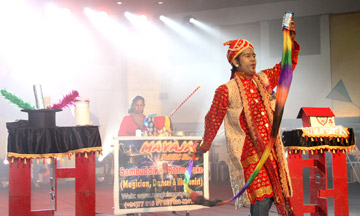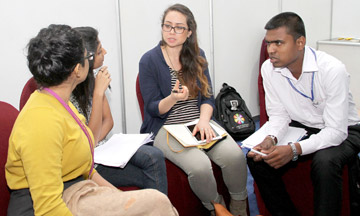WCY focuses on good governance
By Naalir Jamaldeen
The 15th World Conference on Youth concluded last week. Several youth
related problems were discussed during the conference under various sub
themes .
Discussions on the second day were based on the theme 'Achieving Good
Governance and Accountability'. Discussions were held with a
presentation of the Draft Discussion Summary by Ms. Hannah Smith, a
facilitator of the round-table discussion presided by panelists
chairperson of the Commonwealth Youth Council Ahmed Adamu and CEO of the
Halogen Foundation (Singapore) Sean Kong and Advocacy Adviser of Plan
International Ms. Amanda Lundy.
|

A cultural item staged during the inaugural ceremony |
Adamu gave an extended definition of 'good governance'. He said that
accountability is one of the main factors of good governance. He said
there are four types of governance such as the one disliked by people,
one feared by people, praised by people and one that people do not know
the existence of which is the best one."
While elaborating the benefits of good governance , Kong described
the present Singapore and its state 60 years ago. The primary objective
of his speech was to show how an under-developed migrant society in
Singapore was transformed . He added that "policies of a country should
be amended in a way that they change the attitudes of the people for
their betterment." Lundy said that "Governance is a series of
possibilities moving from bad to good," stressing the importance of
access to information with many examples from Malawi.
The next theme that was taken during the round-table discussion on
the second day was "Realising Peace, Reconciliation and Ending Violence.
Nearly 100 youth from across the world participated in the discussions.
Minister of Youth and Sports of Nepal Purusottam Paudel, the
International Secretariat and Outreach Coordinator of the United Network
of Young Peace Builders Ms. Matilda Flemming and the Executive Director
of Lakshman Kadirgamar Institute for International Relations and
Strategic Studies Asanka Abeyagoonasekera participated in the panel
discussion.
Flemming said that to realize peace in a country there should be an
"accountable government as well as a strong opposition.."
"We need a strong policy framework to facilitate peace building and
peace in the post-2015 agenda," Flemming emphasized the importance of
respecting each other as the lowest level of peace building,.
During his speech Minster Paudel focused on the process of peace and
reconciliation of Nepal. "When the monarchy was toppled in a decade-long
civil war involving the Communist Party of Nepal (Maoist) and mass
protests by all major political parties led to the establishment of the
democratic republic in 2008," Paudel said. He also stressed the
importance of active participation of youth in the peace building
process. Abeyagoonasekera spoke o n the peace building process of Sri
Lanka during which he mentioned that he is also a victim of the
Liberation Tigers of Tamil Eelam (LTTE) as his father was killed in an
attack by the LTTE. He mentioned that reconciliation is fruitful when
forgiveness is there.
"In our reconciliation process, it is important to get the positive
engagement of the Tamil Diaspora," he said.
The second round-table discussions on "Inclusive Youth Participation
at All Levels" was held at BMICH on the second day with the
participation of U.N. Volunteers Program Officer. Narendra Mishra and
the Founder and President of the Youth Advocacy Group, Luiz Carlos
Guedes. Starting off the session, Mishra spoke about a global thematic
consultation on post-2015 and governance. He said that youth concerns
are critical for post 2015.
Young people must be involved in design and ownership a new draft
agenda. Mishra added that youth should be involved in policy shifts
towards a green technology and environmentally efficient modes of
increasing employment innovation and shared wealth creation. "Full
accountability comes only when people participate," Mishra said, adding
that the 2010 Millennium Development Goals (MDGs) review placed emphasis
on voice, accountability and the full participation of all segments of
society in the decision-making process.
|

Youth at a discussion |
Mishra highlighted that youth engagement at national and
international levels could be enhanced because ultimately it will be
local, national and regional youth that will participate in the
achievement of goals. National youth councils are increasingly providing
platforms for youth to participate in decision-making processes but the
world needs a mechanism to track implementation. Meanwhile, Carlos, in
his comments at the session said that "real participation."
"It's unbelievable that today, when young people are 1/3rd of the
population, we still have to discuss about participation", he said.
The youth cannot have a limited voice and space, he said. They need
freedom to speak and to be heard but participation is not only speaking
or being listened to. He also said that most companies and politicians
say that they care about youth participation thus have made consultation
available and asked young people to speake about something, but
consultation is not participation. It's a tool for participation.
Participation goes far beyond consultation.
They can't ask young people what we think and then take the decisions
by themselves, Carlos said. Real participation is a whole process from
planning and taking decisions, to implementing and evaluating it. The
final outcome has to be made with a participative process. Carlos
concluded his statement by stating, "It's a privilege to be here. We
have to engage people that have no access to technology, people who
can't speak English or any other U.N. major language. I know it's hard.
I know it demands money, people, time and commitment. But it's needed. |

